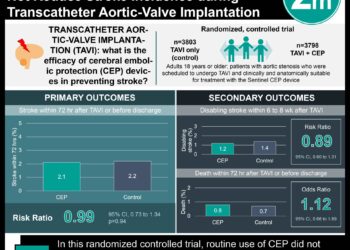EMERGE trial: Delayed coronary angiogram noninferior for patients with out of hospital cardiac arrest
1. In patients who experienced an out of hospital cardiac arrest with no ST elevations on post-resuscitation electrocardiogram, emergency coronary angiogram was not associated with a better 180-day survival rate with minimal neurologic sequelae when compared to delayed coronary angiogram
Evidence Rating Level: 2 (Good)
Study Rundown: The most common cause of sudden cardiac death is ischemic cardiac disease, specifically the acute occlusion of coronary arteries. In patients with ST elevation seen on post-resuscitation electrocardiogram (ECG), retrospective studies have reported a high probability of finding a coronary artery lesion upon coronary angiogram (CAG). Thus, an emergent CAG is recommended in these patients who achieved return of spontaneous circulation (ROSC) following sudden cardiac death with no ST elevations seen on post-resuscitation ECG and no other obvious noncardiac causes of death. However, in patients without ST elevation seen on post-resuscitation ECG, there is a much lower chance of discovering a coronary artery lesion on CAG. Thus, the role of emergent CAG in these patients is unclear. Previous randomized studies have shown no difference between early versus delayed CAG in patients who experienced out of hospital cardiac arrest (OHCA) without ST segment elevation, but given limitations of these prior studies, there still exists a need for high quality data. The EMERGE trial was a national, multicenter, randomized trial that randomly assigned survivors of OHCA to emergency CAG or delayed CAG (within 48-96 hours). Participants were contacted at the 180-day mark to assess for the primary outcome of 180-day survival rate with no or minimal neurologic sequelae (cerebral performance categories (CPC) 1 or 2). According to study results, no difference was found between the early and delayed CAG groups with respect to the primary outcome. Furthermore, findings of this study are consistent with previous randomized controlled trials studying similar populations. A major limitation of this study was the inability to achieve the preplanned enrollment size, resulting in an underpowered study. Overall, the EMERGE trial was an underpowered trial that provided evidence that emergent CAG is not linked to better outcomes than delayed CAG in patients with non-ST elevation OHCA.
Click to read the study in JAMA Cardiology
Relevant Reading: Angiography after Out-of-Hospital Cardiac Arrest without ST-Segment Elevation
In-Depth [randomized controlled trial]: Participants were randomly assigned to either emergency or delayed CAG after surviving an OHCA. Between the two groups, 180-day survival rate with minimal or no neurologic deficit (CPC 1 or 2) was compared. Included were patients ≥18 years of age that experienced an OHCA with return of spontaneous circulation (ROSC) without ST elevation, that were afterwards admitted to a care center that had an intensive care unit (ICU) and 24/7 interventional cardiology. In total, between 22 French centers, 279 patients were enrolled in the study between January 2017 to June 2019. 141 patients (50.5%) were assigned to the emergency CAG group and 138 patients (49.5%) were assigned to the delayed CAG group. Of those randomized, 126 patients (89.4%) in the emergent CAG group and 74 patients (53.6%) in the delayed CAG group received CAG. Follow up was conducted at an outpatient clinic or through telephone to determine CPC score. Statistical analysis was done using Kaplan-Meier plots, and treatment effects were estimated using Cox models and were presented as hazard ratios (HRs). Survival rate at 180 days with CPC 1 or 2, indicating minimal or no neurologic deficit, was 34.1% in the emergency CAG group and 30.7% in the delayed CAG group, which did not represent a statistically significant difference (HR 0.87; 95% CI, 0.65-1.15; P = .32). There was also no difference in the overall 180-day survival rate between the emergent and urgent CAG groups (HR 0.86; 95% CI, 0.64-1.15; P =.31). Overall, the EMERGE trial findings suggest no improvement in 180 day survival rate in patients who experienced an OHCA without ST elevation who received an emergent CAG versus a delayed CAG.
Image: PD
©2022 2 Minute Medicine, Inc. All rights reserved. No works may be reproduced without expressed written consent from 2 Minute Medicine, Inc. Inquire about licensing here. No article should be construed as medical advice and is not intended as such by the authors or by 2 Minute Medicine, Inc.





![The ABCD2 score: Risk of stroke after Transient Ischemic Attack (TIA) [Classics Series]](https://www.2minutemedicine.com/wp-content/uploads/2013/05/web-cover-classics-with-logo-medicine-BW-small-jpg-75x75.jpg)